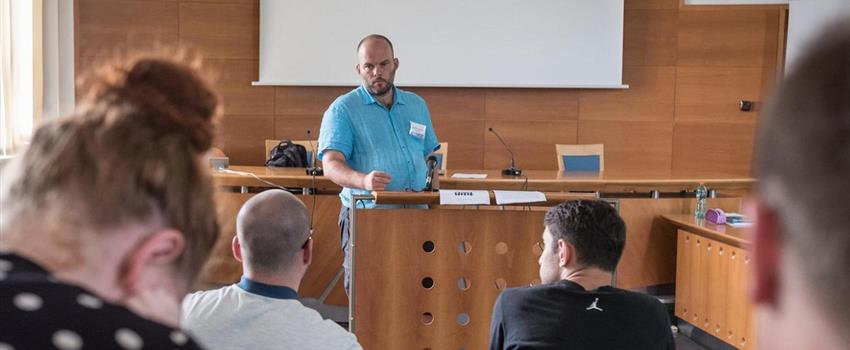Event -
Workshop for Law Teachers on Teaching Legal Ethics

European Network for Clinical Legal Education and Palacký University in Olomouc, Faculty of Law, organized the Teaching Legal Ethics: A Workshop for Law Teachers, which took place at Palacký University in Olomouc, Faculty of Law, on Friday 24th May and Saturday 25th May 2019.
Workshop facilitators: This workshop was led by Professors Lisa Lerman, Jim Moliterno and Philip Schrag from the United States of America. Professor Lerman taught ethics for more than 30 years at Catholic University in Washington and at other law schools. Professor Schrag has used the problem method as part of the curriculum during nearly 50 years of clinical and podium teaching at Columbia Law School and Georgetown University, where he teaches legal ethics and directs a clinical program. Together, they are the authors of textbook, Ethical Problems in the Practice of Law, the most-assigned legal ethics textbook in the United States. Professor Moliterno has taught lawyer ethics for 35 years at US law schools and has taught or designed such a course in ten countries outside the US. He is co-author of the book Global Issues in Legal Ethics, which has been translated into Czech, Mandarin, Georgian, and soon, Slovak. The workshop was organized by Maxim Tomoszek, president of ENCLE and vice-dean for education of Palacký University, Faculty of Law.
Goals: This workshop offered models for law professors who teach or plan to teach legal ethics, be it in a separate course or within clinical legal education. It will focus on classroom teaching methodology, particularly the problem method and interactive discussions, but also address the issues that can arise within legal clinic and offer suggestions, how to develop ethical sensitivity in clinical students. In addition, the workshop will discuss pedagogical goals for the course and selection of teaching materials, as well as some general theoretical foundations for teaching legal ethics.
Problem method: The problem method puts students in the roles of lawyers confronting ethical dilemmas and leads them through an experiential analytical and problem-solving process. This can increase the students’ ability to recognize ethical issues as they arise in practice, their ability to identify and apply ethics codes and other relevant legal standards, and their ability to identify and evaluate the strategic and practical issues that bear on the problems.
In using the problem method, students are presented with a set of facts (most often based on a situation that actually arose for a lawyer) that involves one or more ethical dilemmas. An ethical “dilemma” is not a situation in which a course of action would be obviously wrong (such as stealing money from a client), but one in which any chosen course of action will serve one legitimate value (such as loyalty to a client) at the cost of another (such as complete candor to a court). Students assume the roles of lawyers in the scenario. Students must choose one of several courses of action and justify their choices after taking into account the ethical rules and other relevant law, the actual norms of the legal profession, and strategic and practical concerns. In the classroom, law students typically disagree about what is the best decision, and the ensuing discussions increase their interest in and skill in addressing ethical issues. Once the students have analysed a problem, the professor can reveal what the lawyer who faced the problem actually did, and what if any consequences followed.
Interactive discussion: The workshop will discuss use of Socratic dialogue and the use of small group discussions to “prime the pump” for a large group discussion. It will explore the optimal relationship between lectures and large and small group discussions in class. It will demonstrate the use of audio-visual tools such as power point, video clips, wireless polling technology and student-teacher role plays to deepen student engagement.
Professors Moliterno, Lerman and Schrag will explain and demonstrate various teaching approaches, and then will invite participants to participate in problem-method discussions and to experiment with creating their own problems based on European ethics law. There will be ample time to discuss the extent to which methods that are used to teach ethics in the United States can be effectively employed in European law schools.
Venue: the workshop will take place in the premises of the Palacký University in Olomouc, Faculty of Law, at address 17. Listopadu 6, Olomouc, Czech Republic.
Program:
Friday 24th May
9:00 – 9:45 Welcome and introductions
9:45 – 10:15 Why teach ethics in law school and why use interactive methods
10:15 – 10:30 Coffee Break
10:30 – 12:45 Demonstration of ethical problems and interactive teaching methods
12:45 – 14:00 Lunch (Lunch talk: Building ethics courses in Europe)
14:00 – 15:00 Demonstration (continued)
15:00 – 15:50 Breakout groups: Evaluation of the demonstrated problems and methods
15:50 – 16:10 Coffee Break
16:10 – 16:40 How to write a good problem and choose appropriate methods
16:40 – 17:00 Instructions for Saturday – writing and teaching problems
18:30 - Dinner
Saturday 25th May
9:00 – 10:30 Breakout groups: developing own teaching unit
10:30 – 11:00 Coffee Break
11:00 – 11:30 Breakout groups: finalizing own teaching unit
11:30 – 12:30 Breakout groups: teaching own teaching units + feedback
12:30 – 13:30 Lunch
13:30 – 15:00 Breakout groups: teaching own teaching units + feedback
15:00 – 15:30 Coffee Break
15:30 – 16:30 Breakout groups: review, evaluation of teaching units
16:30 – 17:00 Group reports and summary